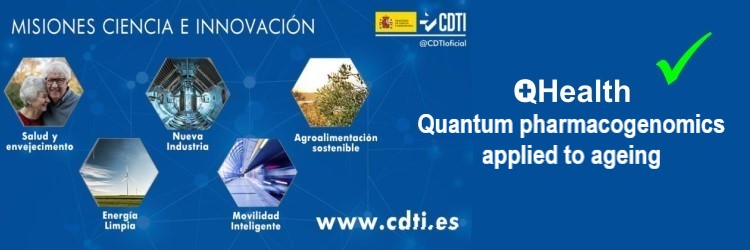On November 27, the Center for the Development of Industrial Technology (CDTI) of the Ministry of Science and Innovation of Spain, made public the list of the granted projects among those submitted to the call for the 2020 CDTI Missions Program, within the framework of the Spanish program of Business Leadership in R&D. The detailed list of the granted and rejected projects can be consulted on the CDTI’s Science and Innovation Missions page.
In this Misiones call, the project “QHealth: Quantum Pharmacogenomics applied to aging”, which has a total budget of € 5,160,477.00, has been approved. The approval of the project by the Misiones 2020 program means that the QHealth project will receive a 3,671,281.69 euro grant from the CDTI.
The project, started in August 2020, is carried out by the Consortium formed by aQuantum (alhambraIT, Prologue Group), Consortium leader, and the companies Gloin and Madrija, specialists in software development and consulting with extensive experience in projects applied to aging and health. The project is carried out with the scientific collaboration of the University Institute of Biosanitary Research of Extremadura (INUBE) in collaboration with the Pharmacogenetics and Personalized Medicine Unit, the University of Extremadura (UEx) and the University of Castilla La Mancha (UCLM).
The most important aspects that allow QHealth project to reach the top world position of basic research in quantum pharmacogenomics are the following:
- Addresses the hypothesis about the existence of a correlation between physiological and genetic variables, the history of drug use to which an older adult has been exposed, including reactions to these and the possible side effects and lack of response of new drugs in a near future. In this research project, simulations that allow the prediction of those events by means of the implementation of quantum algorithms will be carried out. The results will contribute to the increase in older adults longevity and quality of life.
- Focuses on the most relevant factors to avoid side effects and failures in the effect of frequently prescribed medications in the case of the elderly; when doctors prescribe a new drug or make changes to the drugs the patient is taking. Quantum simulations allow us to study these questions, something that is impossible with classical computers.
- Studies the creation of a methodological and technological environment that, will allow the development of future health software solutions based on quantum computing for the optimization of the prescribing drugs administration. Moreover, the methodological and technological environment will allow to map the evolution of the patient related with the prescribing drug consumption and his/her genetic and environmental limitations onto quantum simulations. This will, for the first time, allow doctors the possibility of using the results offered by quantum computing technology for carrying out proactive aging treatments.
The QHealth project, through scientific research, the design of methods, methodologies, models and technologies, as well as the experimentation of its results with the QPath Platform, will not only allow progress to pharmacogenomics in personalized medicine, but will also allow giving a great leap in the knowledge and design of effective methods and means to dynamically connect the real world, in this case that of health systems, with the invaluable services of quantum computing.
It is noteworthy that only 24 of the 100 projects presented have received CDTI approval. Therefore, aQuantum congratulates the team that has made such a relevant result possible, as well as the Gloin, Madrija, INUBE, UEx and UCLM teams.
The general objective of the CDTI Missions is to support major strategic initiatives, intensive in R&D and developed in public-private collaboration, that incorporate the latest scientific-technical trends and technologies to identify and solve the challenges of critical productive sectors for the Spanish economy.


Recent Comments